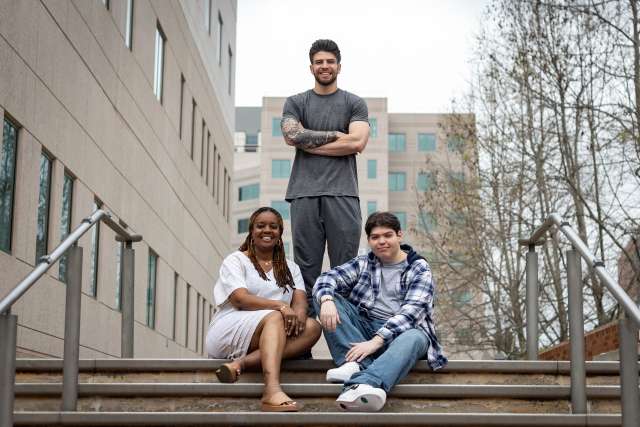Paul Satz, a UCLA professor emeritus of psychiatry and biobehavioral sciences and the founder of the neuropsychology program at UCLA's Semel Institute for Neuroscience and Human Behavior and Resnick Neuropsychiatric Hospital, died June 20, in Lihue, Hawaii, after a long battle with cancer. He was 77.
One of the founders of the discipline of neuropsychology, Satz was widely recognized for his groundbreaking research on brain–behavior relations. During his tenure at UCLA (1981–2002), he established the UCLA Neuropsychology Program and helped turn it into one of the world's largest and most successful training programs for clinical neuropsychologists.
The author of more than 300 publications, Satz's scientific contributions to the understanding of normal and abnormal brain development had — and continue to have — a major impact on diverse disciplines. His seminal contributions include landmark works that laid the foundation for the understanding of healthy and pathological asymmetries of brain structure and function; innovative theories of developmental disorders, including autism, dyslexia, attention deficit disorders and schizophrenia; and trailblazing research on the cognitive and affective consequences of head injuries and HIV/AIDS.
In recent years, Satz made additional high-impact contributions to the understanding of how individual differences in brain structure and function may protect people from the declines usually associated with aging, dementia and head injuries. He was widely acknowledged as a scientist uniquely capable of deep and creative insights into both the clinical and basic scientific foundations of the topics he investigated.
"It is impossible to summarize the accomplishments of a man who forged an entirely new discipline and transformed every area of inquiry that he encountered," said Robert Bilder, a colleague of Satz and a professor-in-residence of psychiatry and biobehavioral sciences at UCLA. "Neuropsychology has lost one of it's most innovative and critical thinkers. I believe, however, that Paul was proudest of the lasting impact he had on such a large number of students. Fortunately, we can still hear echoes of Paul's voice in their continued teaching and research, passion for discovery of truth, and love for their own trainees, colleagues and patients."
Always deeply dedicated to teaching and mentorship, Satz directed, sponsored or co-directed some 31 training awards at UCLA and served in mentorship roles for more than 200 trainees. Even after his retirement, he personally sponsored fellows at UCLA and continued to supervise students and develop collaborative relationships, including the UCLA–Help Group Fellowship in Neuropsychology, which is named in his honor.
His legacy is evident in the large number of his students who have gone on to make major contributions to the field. Many of Satz's trainees also continue to serve actively in the medical psychology and neuropsychology programs at the Semel Institute and the David Geffen School of Medicine at UCLA.
Satz studied music at Boston University in the early 1950s and received his bachelor's degree in 1957 and a master's in clinical psychology in 1959 from the University of Miami. After earning his doctorate from the University of Kentucky College of Medicine in 1963, he served as a postdoctoral fellow and, in 1964, established the sub-specialty of clinical neuropsychology in the department of clinical and health psychology at the University of Florida.
Satz continued to direct the University of Florida's neuropsychology program through 1979. He then served as a visiting professor at the University of Victoria in British Columbia before coming to UCLA in 1981.
Satz was president of the International Neuropsychology Society from 1973 to 1974, and in 1981, he became a founding member of the American Board of Clinical Neuropsychology. He was one of the board's inaugural diplomates in clinical neuropsychology, complementing his diplomate status in clinical psychology.
The recipient of numerous accolades, Satz was honored with the Albert J. Harris Award from the International Reading Association (1977), the Meritorious Service Award from the American Board of Professional Psychology (1988) and the American Psychological Association Award for Distinguished Professional Contributions to Knowledge (1997). He held leadership roles in more than 26 organizations spanning many disciplines in psychology, neuropsychology and learning disorders, including the President's Commission on Mental Health.
Satz's many scientific, clinical and training contributions were matched by an irrepressible sense of humor, a love of life, and a joy in the company of others. In a recent tribute, Satz was described as a champion of "serious fun," acknowledging his rare combination of scientific rigor and joie de vivre.
An accomplished pianist, Satz fondly recalled a newspaper that once published his picture, mistakenly identifying him as Frank Sinatra, to whom he bore an uncanny resemblance.
Satz is survived by his son Mark, with whom he lived in Hawaii; daughter Julie Satz, of Kona, Hawaii; son Scott, of Hibbing, Minn.; brother George; sisters Ada Casperino and Ruth (Henry) Best; and grandchildren Ryan and Jade Satz, Alexia Satz, and Drake and Dustin Satz.
A memorial fund has been established in honor of Dr. Satz to support education in neuropsychology. To contribute by check, please make checks payable to The UCLA Foundation and write "Paul Satz Memorial Fund" in the memo section. Checks should be mailed to Alan Han, Director of Development for Neuroscience, UCLA Medical Sciences Development, at 10945 Le Conte Ave., Suite 3132, Los Angeles, CA 90095-1784.
A tribute to Satz will be held on Friday, Aug. 6, at UCLA. For further details, please contact Robert Bilder at 310-825-9474 or [email protected].



